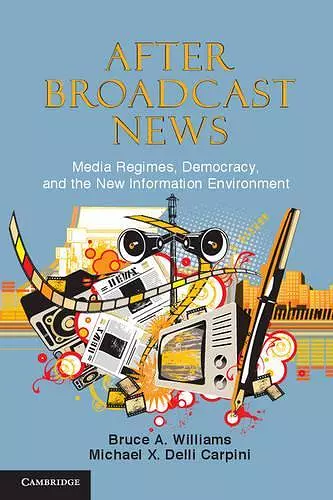After Broadcast News
Media Regimes, Democracy, and the New Information Environment
Bruce A Williams author Michael X Delli Carpini author
Format:Paperback
Publisher:Cambridge University Press
Published:10th Oct '11
Currently unavailable, and unfortunately no date known when it will be back
This paperback is available in another edition too:
- Hardback£88.00(9781107010314)

After Broadcast News challenges the role of professional journalists as the primary source of politically relevant information.
Most people assume professional journalists are the legitimate source for political information and that the role of 'good' citizens is to watch, read or listen to the news. While this model has some valuable aspects, it also has very narrow notions of politically relevant information and the role of citizens.The new media environment has challenged the role of professional journalists as the primary source of politically relevant information. After Broadcast News puts this challenge into historical context, arguing that it is the latest of several critical moments, driven by economic, political, cultural and technological changes, in which the relationship among citizens, political elites and the media has been contested. Out of these past moments, distinct 'media regimes' eventually emerged, each with its own seemingly natural rules and norms, and each the result of political struggle with clear winners and losers. The media regime in place for the latter half of the twentieth century has been dismantled, but a new regime has yet to emerge. Assuring this regime is a democratic one requires serious consideration of what was most beneficial and most problematic about past regimes and what is potentially most beneficial and most problematic about today's new information environment.
“After Broadcast News does more than any book I know to explain why the old distinctions between news, opinion, and entertainment are breaking down and why these changes are not a catastrophe! Williams and Delli Carpini provide a powerful, critical revisionist history of journalism’s so-called golden era, trimming it down to size as simply the latest – and not necessarily the greatest – ‘media regime’ since the dawn of American democracy. As economic, cultural, and technological forces create the conditions for a new order, the authors present ample evidence of talk show hosts, filmmakers and actors, comedians, musicians, bloggers, and engaged citizens making creative use of media for democratically-useful ends. Journalism will continue to have an important role to play. At the end of the day, though, what’s really important is not who produces politically-relevant discourse, but simply that it is created and disseminated as widely as possible. This book will change the way you see the world. It’s a compelling call to arms to stop fighting the last era’s media battles in order to better direct the changes to come.” – Rodney Benson, New York University
“An insightful, well written and thoroughly researched analysis of what the rise of entertainment, the internet and digital media mean for the quality of journalism and democracy. While being firmly anchored to the US experience, it is highly relevant for Europe, Asia and elsewhere since we are all engulfed in a similar process of change.” – James Curran, Goldsmiths, University of London
“Political communication took place for most of the late twentieth century in a media environment dominated by professional journalistic gatekeepers, dedicated to norms of social responsibility, largely insulated from commercial pressures, and at the same time closely tied to established political elites. Over the past couple of decades, this ‘media regime,’ as Williams and Delli Carpini put it, has broken down, and a multitude of hybrid genres and competing gatekeepers with divergent motivations and ideologies have replaced the bounded, unified system of the previous era. We are still sorting out how to understand political communication in this new era, and Williams and Delli Carpini make a sophisticated, lively contribution to accomplishing this. It makes a big difference that they bring to this task a good sense of history, and put the most recent transformation of American political communication in the context of along and complex history of contention over the rules of the game for determining who gets to speak about politics and how.” – Daniel Hallin, University of California, San Diego
ISBN: 9780521279833
Dimensions: 230mm x 152mm x 20mm
Weight: 510g
376 pages